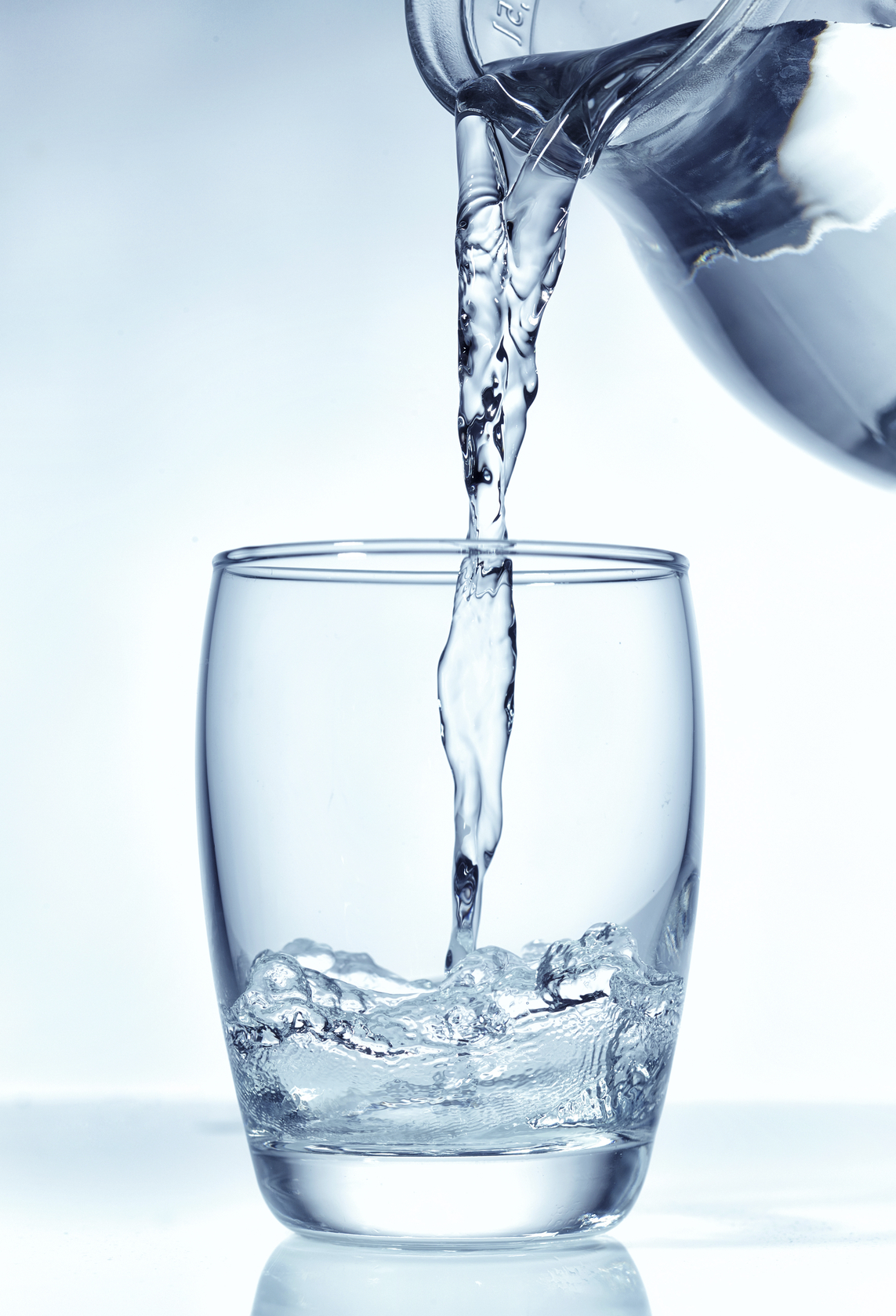Water is a priority for the brain (and body)
Most people know that water is the number one compound in their body, but they are not aware of all the functions it has to perform.
These functions are important for your brain, the rest of your body and your skin.
Drinking more pure water can, within a very short space of time, transform the way your brain works, how much energy you have and what your skin looks like.
What exactly does water do in the brain (and body)?
Although water isn’t a nutrient like vitamins and minerals, it is critically important for optimal brain (and body) function, and the following processes, which water enables, are necessary for optimal brain function.
Water is the universal solvent and carrier, which means that it has the ability to carry nutrients, such as glucose and amino acids, as well as other nutrients, to every cell in your skin and body – including your brain
Water flushes wastes and toxins out of your cells, excreting them through your kidneys, bowels, and skin
Water helps to maintain blood circulation and volume, essential functions for all tissues and organs
Water facilitates thermoregulation, which allows the body to maintain an even temperature by monitoring perspiration
Water acts as a lubricant and absorbs shock/harsh movement, protecting organs and joints as well as the lungs, heart, gastrointestinal tract and mouth from damage
Water helps your brain to work properly, because neuronal impulses rely on water for electrical transmission
Water increases the capacity of hemoglobin (the red pigment in blood) to carry oxygen, which influences life at the cellular level
The digestive process requires water, along with digestive enzymes, to break down foods
An even more specific role in the brain …
Water comprises more of the brain in percentage terms (between 70 and 80% by weight), than any other organ of the body, so dehydration will influence brain functioning quickly.
The electrical transmissions within the central nervous system enable thinking, sensing, learning and activity.
Optimal nerve and muscle function rely on membranes having the correct polarity, which is part of the electrical transmission process.
When dehydration sets in, this affects the polarity across the membrane, and this in turn influences the ability of the membrane to be selective about what it responds to.
When a cell has high polarity, it raises the threshold of sensitivity at the cell membrane, which increases its integrity.
It becomes less sensitive to outside stimuli, which indirectly allows enhanced selective focusing, which can impact focus and concentration, and therefore learning and memory.
From the microcellular level to macro-level, this translates into the ability to decide what to focus and concentrate on, without being disrupted by outside stimuli.
As so much of the brain is composed of water, dehydration will therefore adversely affect your brain function very quickly.
Research indicates that memory and attention both suffer when a child is dehydrated, and the same is true for adults who experience dehydration.
Adding insult to injury, so to speak, research has shown that mood is also negatively affected when dehydration is present.
Are you dehydrated?
Most people are mildly dehydrated and as they get older, as the part of the brain that is responsible for alerting us to the sensation of thirst becomes less efficient.
Severe dehydration in the elderly can mimic the symptoms of dementia.
In addition, when the body and brain are dehydrated, the stress hormone cortisol is released, which causes brain cells (and all cells, including skin cells) to age quickly.
Research has indicated that certain headaches are caused directly by dehydration in the brain, so if you find yourself suffering from a headache the first thing to do is to drink pure clean water immediately.
Severe dehydration from sweating is capable of causing brain volume shrinkage, so ensuing you stay well hydrated during and after exercise is critically important for brain health.
How to rehydrate?
Drinking artificially sweetened sodas and energy drinks supplies liquid, but not water.
And tea and coffee possess diuretic effects, due to their caffeine content, although it does seem to depend on the amount that you drink and how regularly you do so.
Although tea contains 50 percent less caffeine than coffee does, the caffeine will still influence the balance of fluid retention in the body, which means that the more you consume, the greater the amount of fluid you may lose through your kidneys.
In addition, alcohol has a very dehydrating effect on the body, and contains a significant amount of sugar, which is very bad news for our brain.
Herbal teas can be a good substitute for caffeine-laden tea and coffee, although nothing can replace good, clean, pure, natural water, in terms of what your brain and body require to stay healthy and hydrated.
The general rule to follow, as to how much water you should be drinking per day, is to drink 300 ml for every 10 kg of body weight, or 10 fl oz for every 22 lb.
Water works together with the right fats
Fat is the second most abundant compound in the brain after water, and the presence of the right fats in neuronal membranes, with optimal water content, enables optimal brain functioning.
This occurs from synapse function, to neurotransmitter synthesis at the synapse, and the electrochemical transmission of messages between neurons along the axon.
Combined, the right fats and water in neuronal membranes facilitate neuronal communication and ensure the brain is capable of functioning effectively and efficiently.
Conclusion
Drink water to keep your brain well hydrated and all your cells in peak condition.
It should always be your very first choice of fluid.
If you are addicted to other beverages, like sodas, start diluting them with pure water, until you are able to drink pure water with a squeeze of lemon or lime and enjoy it.
Chop up a few slices of fresh ginger and add them to a cup of boiling water in the evening. In the morning add the juice of half a lemon to this mixture, and sip through a straw to prevent the lemon juice damaging your teeth. This is a naturally cleansing drink.
References
Adan A. Cognitive performance and dehydration. J Am Coll Nutr 2012 Apr; 31(2): 71-8.
Berbis P, et al. [Essential fatty acids and the skin] Article in French. Allerg Immunol (Paris) 1990 Jun; 22(6): 225-31.
Bhave G, Neilson EG. Body fluid dynamics: back to the future. J Am Soc Nephrol 2011 Dec; 22(12): 2166-81.
Blau JN, Kell CA, Sperling JM. Water-deprivation headache: a new headache with two variants. Headache 2004 Jan; 44(1): 79-83.
Edmonds CJ, Burford D. Should children drink more water? The effects of drinking water on cognition in children. Appetite 2009 Jun; 52(3): 776-9.
Edmonds CJ, Jeffes B. Does having a drink help you think? 6-7-year-old children show improvements in cognitive performance from baseline to test after having a drink of water. Appetite 2009 Dec; 53(3): 469-72.
Farrell MJ, Zamarripa F, Shade R, Phillips PA, McKinley M, Fox PT, Blair-West J, Denton DA, Egan GF. Effect of aging on regional cerebral blood flow responses associated with osmotic thirst and its satiation by water drinking; a PET study. Proc Natl Acad Sci USA 2008 Jan 8; 105(1): 382-7.
Grandjean AC, Grandjean NR. Dehydration and cognitive performance. J Am Coll Nutr 2007 Oct; 26(5 Suppl): 549S-554S.
Jéquier E, et.al. Water as an essential nutrient: the physiological basis of hydration. Eur J Clin Nutr 2010; 64: 115-123.
Kempton KJ, et.al. Dehydration affects brain structure and function in healthy adolescents . Hum Brain Mapp 2011 Jan; 32(1): 71-9.
Kempton MJ, et al. Effects of acute dehydration on brain morphology in healthy humans. Hum Brain Mapp 2009 Jan; 30(1): 291-8.
Lieberman HR. Hydration and cognition; a critical review and recommendations for future research. J Am Coll Nutr 2007 Oct; 26(5 Suppl): 555S-561S.
Mayo Clinic Staff. Dementia Symptoms and Causes. http://www.mayoclinic.org/diseases-conditions/dementia/symptoms-causes/dxc-20198504 (accessed 20 October 2016).
Morley JE. Nutrition in the elderly. Curr Opin Gastroenterol 2002 Mar; 18(2): 240-5.


